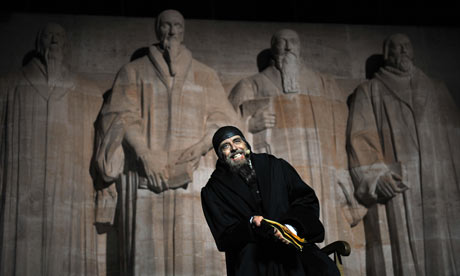
This is the
Anglican shrine of Our Lady of Walsingham, a repository of artistic and conceptual kitch constructed on the site of a
real shrine that went out of business at the Reformation. Built during the grand finale of Anglo-Catholicism Triumphant in the UK, the aim was to recapture the pre-Reformation piety of the English Church before
The Stripping of the Altars, to show everyone that Anglicans
really were Catholic dammit, and to prove that Anglo-Catholics weren't just a bunch of aesthetes and fakers.
But why, one asks, did the builders of the shrine and many other educated, sophisticated people with good taste--including perhaps Eleanor Stump in her commendation of St. Louis Music--feel they had to do kitch to prove that they were really religious? It may be an Anglican thing you wouldn't understand but here is the story.
I grew up in Paterson, NJ, the shooting site (in more ways than one) of several
Sopranos episodes. In Paterson there were just two ethnic groups: Italian and Not Italian. The People of the Land were Italian and the state religion was Mediteranean Folk Catholicism, which ran to lawn statuary and shocking representations of the Sacred Heart.
Growing up as we did, I and other Patersonians saw Catholicism as
real religion, the industry standard, in the way that most Americans now view conservative, evangelical Protestantism as paradigmatic Christianity. And the Catholicism we saw was the Catholicism of Sicilian peasants--tacky, trashy and frankly superstitious though, on the bright side, not in the least guilt-inducing: supernatural beings operated as a transcendental Mafia who could be wheedled and bribed.
Given this picture of what real religion was like we developed two rather strange ideas about religious authenticity:
(1) If it's tasteful, beautiful or aesthetically interesting it's not real religion. Catholics were the only people who put themselves out for religion, who went to church every Sunday (or sent their womenfolk to go proxy) whether they felt like it or not, who stuck with bad marriages because divorce was against the rules. And their stuff was kitch--they weren't just in it for the aesthetics. In fact they weren't into it for aesthetics at all.
(2) If it's reflective, sophisticated, or involves a seriously considered intellectual commitment it's not real religion. Indeed, if it was something in which one was
interested it wasn't real religion. The Catholicism we saw was culture religion. It was inherited, reinforced by classical conditioning and never questioned. It was part of the world-taken-for-granted, more of the boring stuff you had to do but never really thought about. We believed that this stimulus-response, taken-for-granted religion was a deep part of the self in a way that religion which was taken on as a matter of conviction was not.
So this was the model of authentic religion for us and, I suspect, for the movement in the Church of England that produced such self-conscious monstrosities as Walsingham in the interests of religious authenticity. Now one asks: why did Anglicans, who possessed any number of pre-Reformation churches, lovingly restored and maintained by the National Trust, want Walsingham?
The story is similar to the Paterson story. During the 19th century--a century which I believe should never have happened--Anglican Romantics became convinced that the 18th century killed
real religion: the religion of the Middle Ages and the Irish immigrant working class. So in the interests of religious authenticity this was the religious sensibility they tried to emulate.
The irony, perhaps paradox, of these attempts was that striving for authenticity precludes any possibility of attaining it. Call it the Walsingham Paradox. It isn't even the sheer ugliness of the place--I've seen much, much worse--but the overwhelming, embarrassing inauthenticity.

